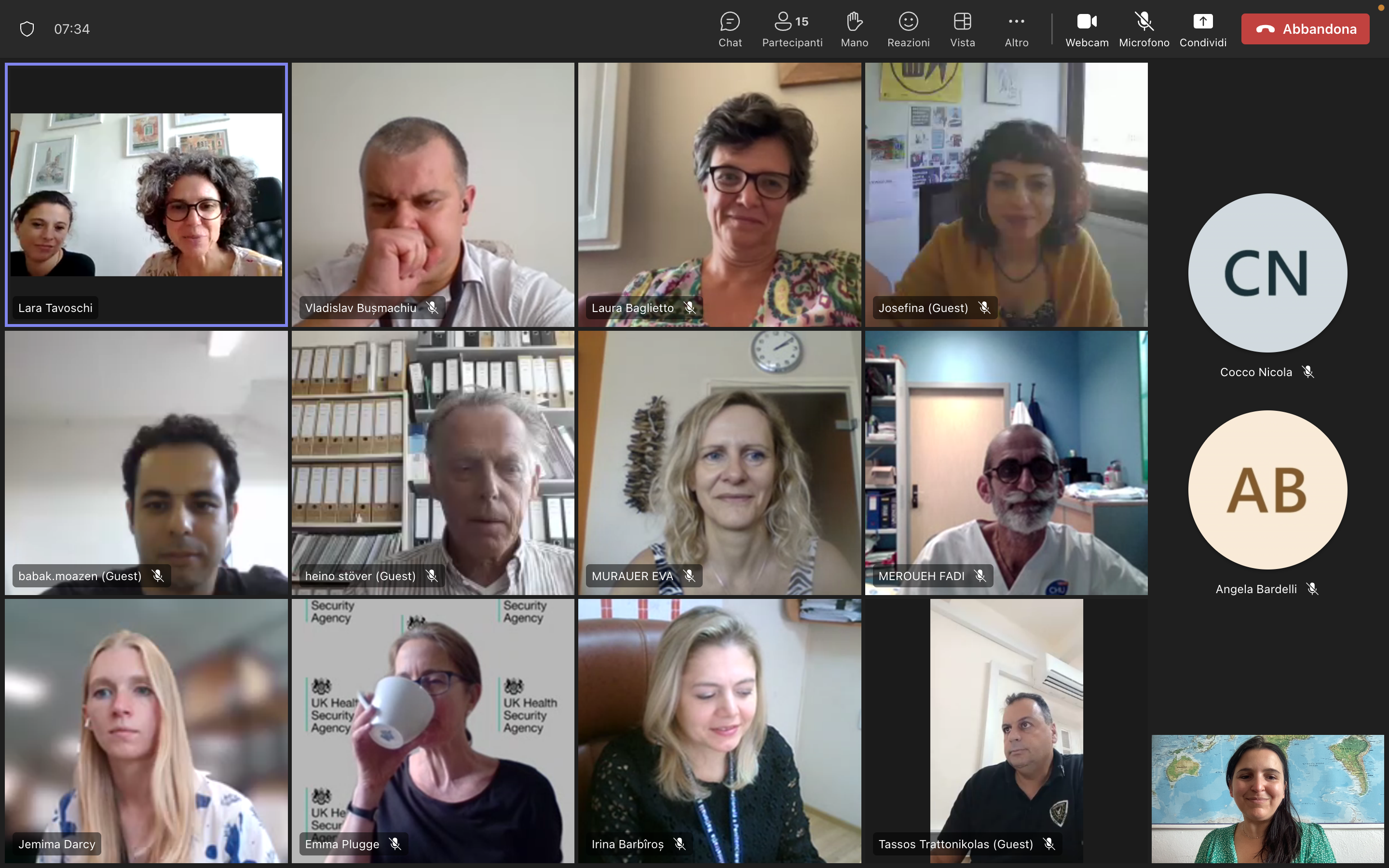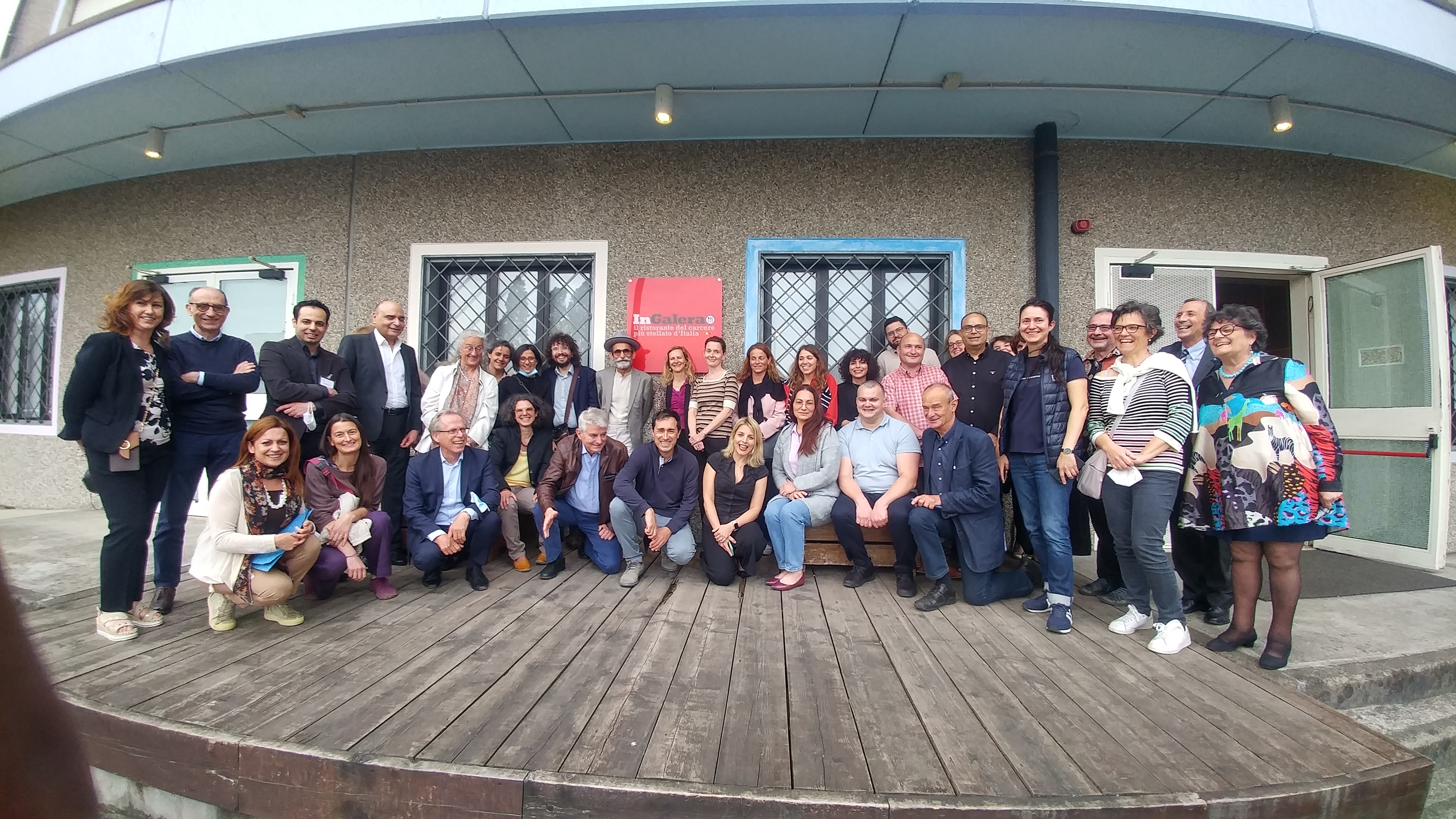
EUDA / Health Without Barriers Conference- 21st October 2024
Acting as one of two events that brings the Rise-Vac project to a close, The Health Without Barriers conference, which was organised as a side event to the European Union Drug Agency (EUDA) annual conference, presented an opportunity for the Rise-Vac consortium to update delegates on the range of work that has been completed over the last 3 and a half years. Lara Tavoschi, the principal investigator, was able to provide an overview of the state of vaccination services in prisons across the consortium countries, with colleagues from the WHO Europe and the International committee of the Red Cross bringing the wider international contexts. Having this context allowed delegates to appreciate the importance of projects such as Rise-vac which progress vital public health issues such as prison health and vaccination.
Throughout the day Rise-vac consortium partners shared findings from some of the key work packages that were now coming to a close. Joe Harper and Mark Gleave from the UK Health Security Agency (UKHSA) were able to present on the development of learning materials for people living in prison and for prison staff. A theme throughout the day was the involvement of those with lived experience. The Rise-Vac learning materials, for example, were co-developed with the Prison Reform Trust who were able to bring the views of those with lived experience to the fore in both the consultation and design phases. The UKHSA were able to present the findings of the consultations and pilots that were conducted in order to develop a 6-minute animation and a 16-page leaflet for people living in prison as well as a 4-hour long E-learning course all of which were aimed at improving vaccine literacy, vaccine uptake and communications skills. Both sets of materials were used as the intervention to the core research element of the Rise-Vac project which involved 20 prisons across the consortium countries to assess whether the materials did improve vaccine literacy in prison staff and people living in prisons. Furthermore, we heard from delegates from Cyprus and France who shared their experiences with implementing the materials in their respective prisons as well as the progress of the newly established vaccine schedules in Moldovan prisons.
Furthermore, colleagues from Italy were able to present the newly published policy brief which is the culmination of all 7 work packages of the Rise-Vac project. The Rise-vac consortium were able to lead a workshop which aimed to gather feedback on the policy brief from delegates. Each group was tasked with reading a chapter of the policy brief and facilitated discussion was conducted to understand how the document could be used in different countries and whether the recommendations contained in the document was relevant to different health and justice systems. Feedback was provided by a range of organisations from all over the world including Australia, the Netherlands and Lebanon, to name a few.
Overall the Health Without Barriers conference was a productive day which allowed the Rise-Vac consortium to reflect on all the excellent work that had been completed over the duration of the project. It was also reassuring to hear that the policy brief, which you can find on the Rise-Vac outputs page, will be used in multiple different countries, and help progress equitable vaccination in prisons.
EUPHA conference – 11th November 2024
Acting as the second of two final events that draw the Rise-Vac project to a close, the European Union Public Health Agency conference presented another opportunity for the Rise-Vac consortium to share a variety of project outputs with delegates as well as the results from the core research elements of the project. The Rise-Vac team were involved in two elements of the EUPHA conference, firstly, a pre-conference event which brought together the three EU commission funded projects which all focus on advancing equitable vaccination and secondly a workshop which aimed to disseminate the scientific research and conclusions from the Rise-Vac project.
During the pre-conference event we were able to hear from our sister projects, AcToVax4NAM and River-EU, which focus on developing tailored interventions for increasing vaccination in newly arrived migrants (NAM) and increasing system literacy and access for health inclusion groups such as marginalised Roma communities respectively. Key presentations included the development of a framework for overcoming system barriers to vaccination, tailoring HPV vaccination interventions for marginalised Roma communities in Slovakia and discussing the (non)-availability of data among migrants and refugees. The final session of the day was a panel discussion which focussed on driving system level change through effective policy. Here, panellists from the WHO, EU commission and the Finnish Ministry of Health e reflect on the work presented throughout the day and offer their thoughts regarding the overall picture of equitable vaccination policy across Europe. This session developed into a helpful discussion regarding possible future projects and further collaboration.
From a Rise-Vac perspective, the pre-conference offered the first opportunity to share the results of the core research element of the project (work package 5). Led by the University of Pisa, this research involved pre and post intervention surveys which aimed to assess whether the intervention, in this case the E-learning course for prison staff, successfully increased vaccine literacy and uptake. The results of the research were promising in that i) vaccine hesitancy decreased after the intervention was introduced ii) positive vaccine attitude was higher after the intervention than before the intervention iii) the effect of the intervention on positive vaccine attitudes remained after a month since the intervention. The early results of the Rise-vac project show that educational materials for staff are suitable and effective in increasing vaccine literacy. The data for people living in prison is still being analysed and will be shared soon.
Overall, the EUPHA conference was an excellent opportunity for the EU co-funded projects to come together and share learnings and outputs with each other and with delegates from a variety of countries and agencies.
Steering Committee Meeting, online, 4th and 5th December 2023:

On the 4th and 5th of December 20204, the RISE-Vac steering Committee, comprising all nice RSE-Vac partners, met online for a technical meeting. The focus of this meeting was a workshop organised by [leads of WP7] regarding catch up vaccination schedules. Each consortium member gave a short presentation on their country’s policy for catch-up vaccination routines.
Given the fact that people living in prison are often under vaccinated and need to be caught up with their routine vaccination schedule, it is important to highlight successful strategies for increasing vaccination coverage within this population. As each partner presented their data and national situation, it became clear that there were similarities but also clear differences in how countries allocate resources to catch-up vaccination campaigns.
As ever, the Rise-Vac consortium provided a platform for a rich and fruitful exchange of ideas, opinions and national perspectives and highlighted areas for further discussion, especially regarding catch-up vaccination schedules for both the prison and general population. We hope our united voice on these matters will raise awareness of the importance of increasing vaccination literacy and coverage within prison populations across Europe and how achieving this will keep those living and working in prison, and ultimately the wider community, safer.
General Assembly and Scientific Advisory Board Meeting at San Vitore, Milan, Italy, 30-31 May 2022

One year after the official launch, on the 30th and 31st of May 2022, project partners met in Milan, Italy, at the San Vittore prison, to discuss the first results of an ambitious programme.
Reaching the hard-to-reach: increasing access and vaccine uptake among the prison population in Europe' - known as RISE-Vac - is a large-scale project funded by the EU's third health programme.
People in prison in Europe constitute a sizeable section of the entire population, not only because of its absolute size, but also for its rapid turnover. People in prison have among the lowest vaccine uptake rates in the region. The implications of this for their health are all the greater since they are also one of the groups of people most at risk from a range of infectious diseases that vaccines can prevent.
RISE-Vac aims to increase vaccination coverage in prisons across Europe and tackling the issue, brings together the skills and experience of numerous experts from across multiple sectors working in the field of prison health. The project is led by University of Pisa and involves other leading academic and healthcare institutions, such as the ASST Santi Paolo e Carlo in Milan and those of other European countries, such as Cyprus, France, Germany, Moldova, the United Kingdom and the European Federation Health without Barriers.
Health professionals and researchers are using data-driven and evidence-based methods to survey the state of vaccine services in prisons, drawing up good-practice guidelines for effective immunisation programmes, and developing training and education resources to improve the understanding of vaccines among prisoners and staff.
For the first face-to-face meeting on the 30th and 31st May 2022, the project partners met at San Vittore prison, where they were able to experience something considered innovative on the European scene: in addition to the scientific activity, partners were introduced to the activities of San Vittore prison, with a focus on the activities of the cooking school cooperative Libera Scuola di Cucina and of Bollate prison vaccination centre. They also visited the In Galera restaurant, which allows inmates on work release to engage in cooking activities, preparing them towards employment when they are fully released.
In addition to the Consortium partners who were all present at this meeting, representatives from some of the lead international and Italian agencies in the field of prison health and health more broadly were present, namely EMCDDA (European Monitoring Centre for Drugs and Drug Addiction), UNODC (United Nations Office on Drugs and Crime), WHO-HIPP (World Health Organization- Health in Prison Programme), PRI (Prison Reform International), ISS (Italian Istituto Superiore di Sanità) and DG SANTE of the European Commission, showing their vivid interest in the event and in the project itself.
The event was a chance to at last meet in person, to carry out a comprehensive and deep update on the activities done, and to exchange experiences and best practices, resulting in a strengthened partnership. The annual activity and financial monitoring of the project was also approved during the meeting.
More than ever, the COVID-19 pandemic has exposed the need to conceive and implement inclusive preventive interventions. By targeting people in prison, RISE-Vac aims to improve the health status of this vulnerable population as well as to increase awareness about the value of quality prison health in tackling health inequities and contributing to the global goal of “leave no one behind”.
You can watch the meeting using the following YouTube links: Day 1, Day 2
Rise Vac Meetings
|
Meetings |
Frequency of meetings |
|
General Assembly |
Once a year |
|
Steering Committee |
Quarterly |
|
Project Management Team |
Bimonthly |
|
Scientific Advisory Board |
Once a year (general assembly) |
|
Ethics Committee |
Quarterly |
|
Communication Board |
Quarterly |